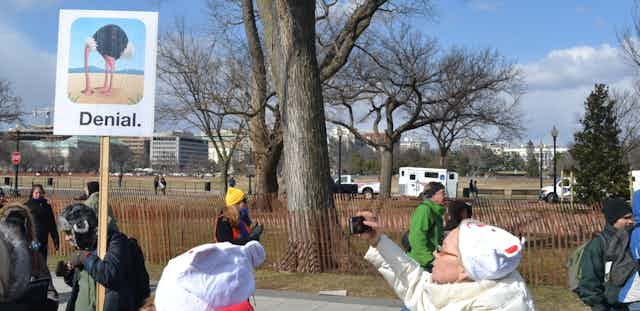There was a time when science was seen as a body secure knowledge, given credibility by the scientific method and peer review.
Back in the 1970s when I was a young lecturer, the task communicating science to the general public was straightforward, at least in principle. I had to understand the science well enough to explain it clearly and simply, then craft that explanation.

There was still the problem of suspicion and hostility within the scientific community.
When Barry Jones was Minister for Science in the 1980s he observed that in the lexicon of scientific abuse, “populariser” ranked just above “child molester”!
There was a feeling that you were letting the side down by explaining the science in terms that were accessible to the general public, in the same spirit as magicians giving away the secrets of their craft.
Some scientists clearly wanted to maintain their community esteem by demonstrating that they understood principles which were a mystery to the general public.
Limits of knowledge
Those views are less frequently observed today, with a growing acceptance that the public has a right to know what they are supporting. Even if those who pay the piper don’t call the tune, they should at least hear the music!
At the same time, we have become more realistic about the limits of scientific knowledge. We now recognise science as a process of successive approximations to an understanding that will always have limitations and uncertainties: “islands of understanding in an endless sea of mystery”, as the distinguished biologist David Ehrenfeld expressed in his book Swimming Lessons: Keeping Afloat in the Age of Technology.
This is most obviously true in the broad area of our engagement with natural ecological systems, where controlled experiments are often not possible, where we can’t measure all of the relevant variables and where we can’t be objective observers even in principle. We are part of the system we are analysing.
So communication demands a responsibility to distinguish between what is known with confidence, what is thought probable but uncertain, and what remains unknown (or, in extreme cases, unknowable).
Climate science
Taking the example of climate science, 25 years ago it was known that human activity was increasing the atmospheric concentrations of greenhouse gases like carbon dioxide and methane, as outlined in the CSIRO’s Greenhouse: Preparing for Climate Change, edited by Graeme Pearman.
It was also known that the climate was changing, with a warming trend superimposed on the year-to-year fluctuations, but most scientists were cautiously saying that it was not possible at that time to be confident that human activity was the cause of the changing climate.

With an enormous amount of detailed scientific work since then, it is now clear that there is a causal link. The number of credible climate scientists, such as Richard Lindzen, who dispute that can now literally be counted on the fingers of one hand.
But there is still legitimate disagreement about the scale and rate of future changes in climate for any given increase in greenhouse gas concentrations.
Trans-science
Several decades ago, the US nuclear scientist Alvin Weinberg pointed out that there is a class of problems which he called “trans-science”. These are couched in the language of science, they clearly require scientific analysis, but it is impossible to give an answer that meets the standards of science.
He cited as examples the operating safety of nuclear reactors and the impact on humans of low levels of ionising radiation. While it might be possible eventually to collect enough data to give credible answers to those questions, Weinberg said, at that time they were unknowable.
He argued that scientists have a responsibility to be clear about what we do not know, rather than claiming to always have the answer.
Denial of science
While our limited knowledge is an issue, a greater challenge now is the backlash against science from those whose interests or ideology are threatened.
Denial of global environmental problems such as climate change, of peak oil and limits to growth generally, is now a serious issue.
So is the denial of science in more modest areas: claimed health problems from wind turbines, claimed sensitivity to radio-frequency radiation, resistance to vaccination, claims that cattle grazing in alpine areas reduces fire risk and so on.
In all of these fields, those denying the inconvenient truths attributed to science resort to personal abuse, unsubstantiated assertions, cherry-picking of data, misquoting of respectable scientists or distorting their views by quoting out of context, and repeating claims that have been systematically refuted.
Leading climate scientists such as David Karoly have become so exasperated by these tactics they will no longer debate the science with deniers.
While only peer-reviewed science reaches the journals, any unqualified person can express their opinion in a blog, on a web site or in the commercial media.
Syndicated columnists such as Piers Akerman and Andrew Bolt are examples, regularly expressing their unqualified opinions for the Murdoch press and labelling those who understand the science as “warmists”, as if we are members of an obscure religious sect.
Getting the right message out
Science communicators have a responsibility to counter this tsunami of misinformation and facilitate community understanding of these important issues. At the very least, we are taking huge risks by ignoring these problems.
More probably, we are actually making choices that are reducing our chance of a “smooth landing” in a future arrangement that could be sustainable and increasing the risk of serious disruption.
Even accepting the limitations of scientific knowledge and the human failings of individual scientists, science still gives us a much better chance of a desirable future – just as it has given us a much more desirable present.
Ian Lowe is the keynote speaker at the Australian Science Communicators 2014 conference. This is an edited version of his speech today.

